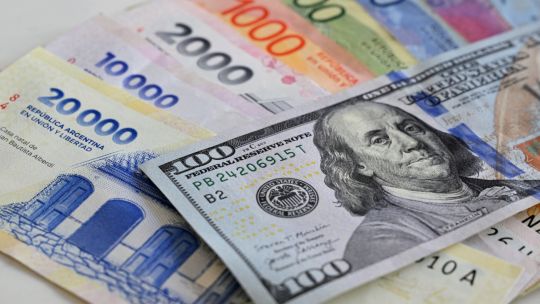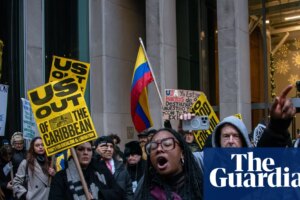
The housing market is thriving in Javier Milei’s Argentina. Cars are flying off the lots, and major airlines are adding Buenos Aires flights to meet surging travel demand. Yet restaurants are evermore empty, hotels are at best half-full and shop vacancies are increasing as the economic recovery starts to lose momentum, at least for the masses.
Two contrasting realities are emerging in Argentina three months before the midterm elections, in which voters’ perceptions of the economy stands to determine how successful Milei’s party will be in winning more support for his austerity and pro-market approach. Income inequality is nothing new in Argentina. But a strong currency is just as much a pillar of Milei’s early accomplishments — lower inflation and poverty — as it is a driver of the country’s uneven recovery led by the libertarian, who is opening up a protectionist economy not used to foreign competition.
On one hand, wealthy and well-educated Argentines are enjoying Milei’s economic policies that translated into greater buying power, which in turn led to more trips abroad and big-ticket purchases at home. For others, the story is quite different: spending on food, clothing and dining out is declining and 60 percent of Argentines anticipate making fewer purchases in the coming months, according to LatAm Pulse, a survey conducted by AtlasIntel for Bloomberg News. Those concerns come as unemployment for salaried, formal jobs has hit a four-year high, while wages adjusted for inflation have declined in recent months.
“I’m barely making it to the end of the month,” says Valeria Ruiz, a 44-year old single mother of two who cleans homes and recently added a travel agency gig to boost her monthly income to 600,000 pesos (US$465), less than what she previously earned in retail with just one salary. In the past year, Ruiz has cut out restaurants. She now hunts for the cheapest brands of milk, pasta and yogurt at the supermarket. “Things are harder now because the job market isn’t like it was before: I always used to have a lot of work, but everything has absolutely halted.”
Ruiz is not alone: 84 percent of the Argentines say they have changed their consumption habits due to the economy, including cutting back on clothing purchases and dining out, according to a survey by pollster Management & Fit. Meanwhile, 67 percent of them have a negative outlook on the economy, according to AtlasIntel. A survey by Argentina’s statistics agency of supermarkets and wholesalers found 27 percent of store owners have a negative view on the state of business, versus only seven percent who say it’s positive.
So far, voters’ economic pessimism has not dented Milei’s high approval ratings. He has managed to bring down inflation, revive mortgage lending and lift currency controls for individuals — all popular moves across society. But to tame inflation, the president has leaned on a stronger exchange rate that fuels demand for durable goods and favours wealthier Argentines, while making restaurants, local vacations and weekend shopping increasingly expensive for many others.
The numbers are impacting Argentina’s outlook: Economists in June trimmed forecasts for this year to five-percent growth after steadily increasing projections in the five prior months — a solid rebound after two years of contractions. Economic activity in May sputtered though, posting the third negative monthly print of the year, albeit mild.
Auto sales rose 78 percent in the first six months of the year compared to the same period in 2024, as purchases of Porsche, Audi and BMW more than doubled, with Toyota and Volkswagen selling the most units. Home sales both in the city and province of Buenos Aires were up about 50 percent through May, and the number of Argentines traveling abroad rose 64 percent, according to industry reports and government statistics. Delta, American, Latam Airlines and Aerolineas Argentinas have added or plan to launch Argentina flights to meet rising demand later this year.
Meanwhile, spending at restaurants in the city of Buenos Aires dropped five of the past six months, and supermarkets have not seen activity bounce back to pre-Milei levels yet. The number of vacant shops in the city rose in the first four months this year to the highest level, 896, since at least 2022. On average, only 43 percent of hotel rooms nationwide were occupied this year through May, consistently down from the same time span in past years and even lower than pre-pandemic levels.
“This is what happens with fixed exchange rate regimes — they boost durable goods consumption, appreciate the currency, and bring inflation down quickly,” said Marcos Buscaglia, co-founder of Buenos Aires-based consultancy Alberdi Partners. The parallel market peso has appreciated by 57 percent in real terms since Milei took office 18 months ago. “On top of that, you have trade liberalisation pushing dollar prices even lower.”
The opening of Argentina’s economy allowed Flavio Ortega, a car dealership salesman in the elite Puerto Madero neighbourhood, to fill his showroom with imported cars and start selling volumes he had not moved since 2018. For the past five years, tight import restrictions meant that 45-year-old Ortega could barely display two cars at a time — a setup that discouraged buyers. But auto imports in June alone were up almost 250 percent from a year ago. “In 2025, with imports back, we’re able to showcase up to 13 vehicles worth as much as US$80,000 each — and we’ve already doubled last year’s sales,” he said.
Gaston Aybar closed 40 percent more real estate transactions in the first half of the year compared to same time in 2024. A stronger peso, lower interest rates that made mortgages more accessible and Milei’s tax amnesty program that convinced Argentines to declare dollar-denominated assets late last year are driving sales. The realtor says mortgages are making it possible for middle-class Argentines to buy or upgrade their homes, even though it comes with tighter monthly budgets.
“Today is a moment when people are trying to invest in something that’s lasting,” says Aybar, 49. “People with some basic savings are asking themselves, ‘Do I spend it on a car, vacation or do I cut back spending and take out a mortgage?’ There’s a shift in people’s thinking to bet on housing.”
TIMES/BLOOMBERG





